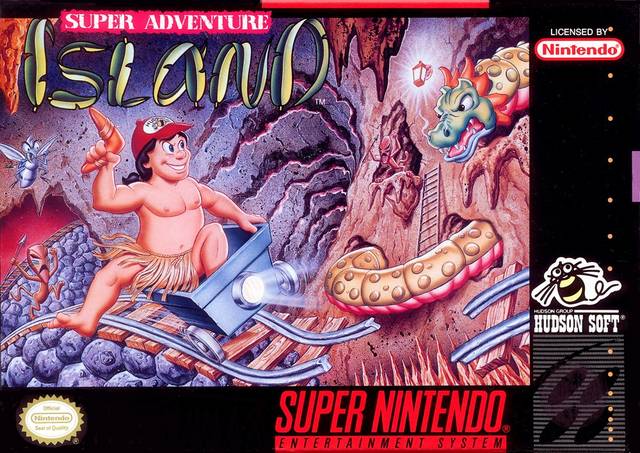
This month marks the 25th anniversary of two amazing Super Nintendo games (in North America). Contra III: The Alien Wars and The Legend of Zelda: A Link to the Past. Both are phenomenal games and undoubtedly two of the greatest titles from not just the 16-bit generation but quite frankly, of all time. This month also sees the 25th anniversary of a less celebrated game. As you might have already guessed, it’s Super Adventure Island. Let’s take a closer look at how Master Higgins fared in his very first SNES outing.
BOX HAUNTINGS
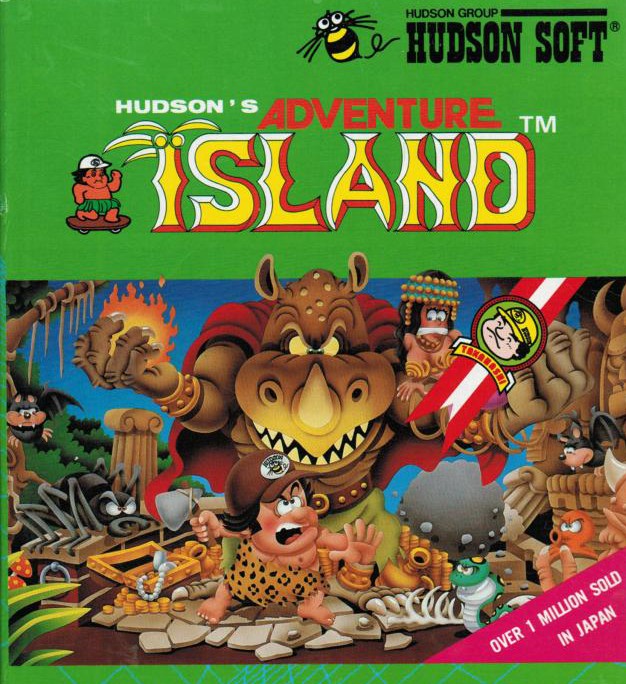
There are certain video game boxes from my youth that have left a permanent mark seared into my memory bank. Hudson’s Adventure Island for the 8-bit NES is one such example. Released in September of 1988, Master Higgins entered the consciousness (and homes) of many youthful lads. Higgins was no Mario, but I always liked the chubby little bastard. Then again, I always had a thing for the underdog. And in a world of 8-bit digitized mascots, Master Higgins was locked firmly in that role.
Simple as can be, but that was part of the charm back then, no?
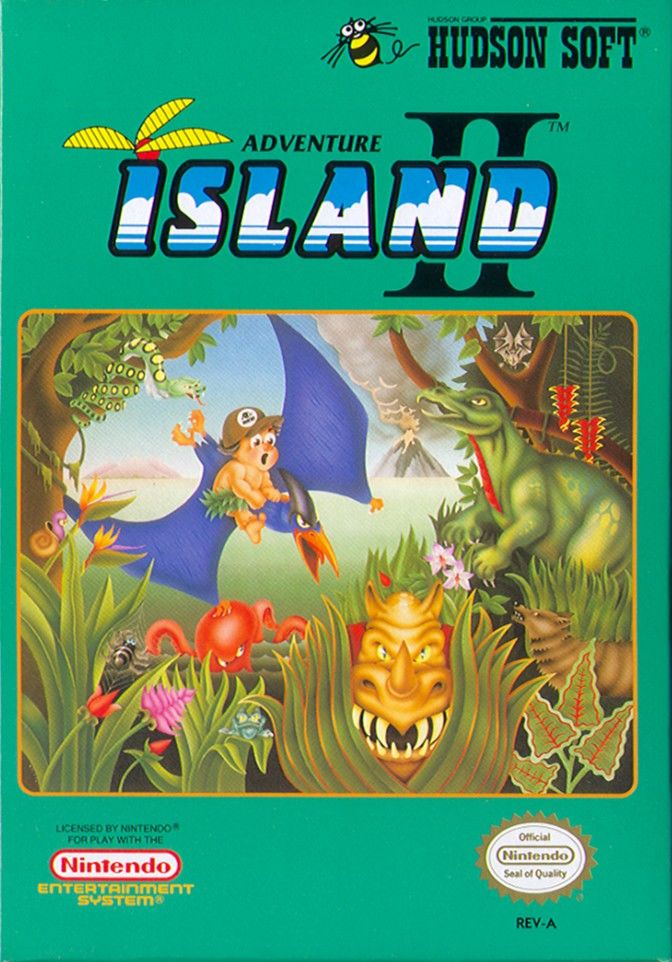
But perhaps no NES box art haunted me more in my youth than that of Adventure Island II. Released in February of 1991, any little boy that saw that box immediately wanted to play it. It perfectly conveys a sense of daring adventure coupled with glorious dinosaur action. I remember thinking there was even a crossover of sorts — with Rocksteady from Ninja Turtles fame as that beast hiding in the bush there! Ah, the innocence of youth and a pre-internet age.
Features the ability to ride various new friends. Fun little game.
BUT WAIT — THERE’S MORE
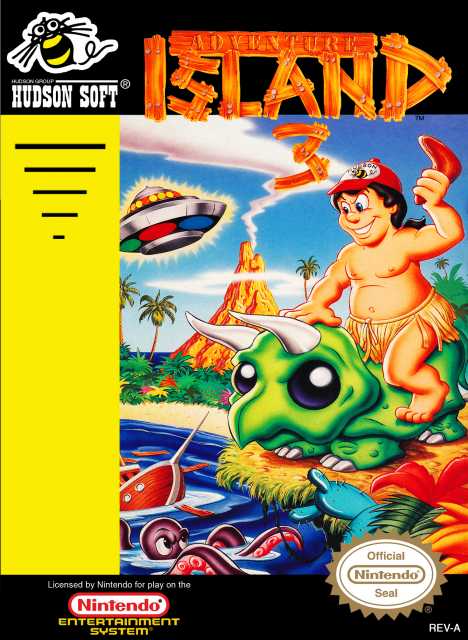
The series jammed on with Adventure Island III coming out September of 1992, a full five months after the 16-bit SNES rendition. Master Higgins enjoyed a decent following so Hudson kept cranking them out.
Master Higgins rides again…
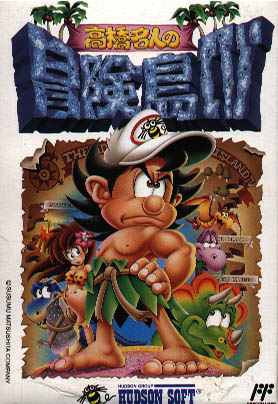
Strangely enough, a Japan only sequel was released for the Famicom in June of 1994. Adventure Island IV came out only four months prior to Super Adventure Island II for the SNES. That’s pretty crazy when you think about it. It was a good year for Master Higgins, apparently.
Adventure Island IV took on a more adventure platformer style.
Of course, many gamers know the origins of Master Higgins. That whole Wonder Boy backstory. But let’s dive into our featured game, Super Adventure Island!
THE STORY GOES…
Master Higgins is chilling with his girl on a beautiful starry night, just minding his own business (and trying to get the business), when out of nowhere comes the dastardly Dark Cloak. Tina was planning to get stoned on this night, but she didn’t mean it THIS way! The Evil One chortles at your misfortune, ruining a perfectly good night. Whistling for your ever trusty feathered friend, you take off for bloody vengeance. It’s not original by any means, but I kind of enjoy these overly simplistic storylines back in the 8 and 16-bit days.
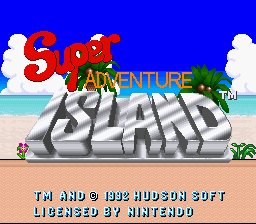
Never trust a bird for transportation. Nice blatant usage of Mode 7, though.
1-1
Chubby Higgins looked great in 16-bit. The yellow bar indicates the time remaining in the level, not Higgins’ health. This is a one hit and you’re dead sort of game. Collecting fruit adds to the timer. In classic Adventure Island form, the skateboard returns.
1-2
Collect the boomerang multiple times and you can throw more than one. Collect them several times and you upgrade to a projectile shot. Now you’re playing with super power. Sorry.
Annoying mechanic I detest: being forced to switch to whatever weapon you touch. Sometimes they’re placed in ill-advised places when you don’t want them but it’s impossible to avoid. Not even Higgins’ new super jump (hold down + jump) can save the day in some cases. So boo on that. But yay for the exit, which looks a lot like a cool little yo-yo, or a shrunken down Captain America shield!
1-3
Beware of rolling boulders and sizzling lava pits.
BOSS NUMBER ONE
Super jump over the flames. Purple projectiles make short work of it.
2-1
Before there was a Tony Hawk, there was a Master mutha effin’ Higgins.
Tropical beach setting suits this game to a tee. But, what in the world is that green mutant beach bum thing there? It’s kind of a weird game…
2-2
Pastel freaks rejoice!
Remember to say hi to Jonah for me…
2-3
Inside the belly of a whale — now that’s what I call an adventure.
Nothing like seeing that glorious exit, even if the levels aren’t long.
BOSS NUMBER TWO
Parodius flashbacks… hmmm…
3-1
Platforming rule #52: There must be a tree level of some sort. I love the little ledge there. It’s the “small” details… [You’re not the LEAST BIT funny -Ed.]
Sometimes there’s hidden fruit lying around. Fire away at random to discover them. The timer can be a bitch in certain stages. Finding these “forbidden fruit” can make all the difference.
3-2
Things start to get a tad “spooky” here.
3-3
Always kind of fun to play a game and see the exact level the box art cover was based upon.
BOSS NUMBER THREE
Super Adventure Island follows most of the platforming tropes but then it pulls this intriguing little number out of its hat. A very unique and challenging boss fight. Reminds me a bit of Godzooky…
4-1
Y’know… if either you or your bird friend were smart, you’d fly directly to the last level. Just saying. The boomerang projectiles are the best since they curve back to you, taking out enemies from behind even!
4-2
Similar to the tree level seen earlier, this one is a vertically scrolling stage. I can appreciate the variety they attempted.
Speaking of variety, here’s another blatant spot of Mode 7 for ya.
4-3
Another swimming level, and a beaut she is, too. Love the colors of this game.
BOSS NUMBER FOUR
Bonehead here looks like a complete badass but is quite easy if you crack the code (and skull). Any boss that wields a light saber gets bonus points in my book. Send his Jedi wannabe ass to the grave!
5-1
Donkey Kong Country has one of the best winter looking stages in all of SNES history. I dare say Super Adventure Island has a fairly underrated looking winter stage in its own right. Probably underrated because the game is so damn tough and few ever make it this far…
Always been a sucker for a good looking winter stage. Oh and skis? Who needs bloody skis?! Certainly not Master Higgins.
Mister beach bum again? Tsk tsk. At least give him a jacket. Well, on the bright side, I really like how this game often previews the next stage at the end of a level. It’s a small touch but it goes a long way. At least as far as presentation is concerned.
5-2
Mickey’s magical castle this ain’t. Tread softly and watch out for spikes.
Disappointing to see more older enemies randomly. The enemy roster is a bit lacking. Almost like they were rushing Super Adventure Island to market. Speaking of market, grab those pineapples and if you squint you’ll see the sweet exit calling your name.
5-3
Lumiere — is that your cousin?! Touch the green star for a bonus bit.
Master Higgins sure knows how to make a dramatic exit.
Oooohhh. Ahhhhhh.
BOSS NUMBER FIVE
Welcome to Dark Cloak’s first form. Nice Badtz Maru impression there.
Feeling a little stiff there, are we?
Master Higgins gets the last laugh.
Someone could use more fiber in their diet…
Scratch that. Someone could use a diet, period.
Platforming Rule #57: Final boss must have a “true” form. You can’t actually harm Dark Cloak with your weapons. Avoid becoming a pancake and have him loosen up the bricks…
Higgins isn’t the fleetest of foot so this can be quite challenging. But if you manage to set things up just right, it’s very satisfying to see the end result.
“Discount Ganon” is about to feel the heat…
“Discount Mario” celebrates a hard fought victory. Huh, I’m in the mood for some bacon all of a sudden.
Nothing like a crap ending to reward your efforts in such a difficult game. Nice transition, though. But yeah, can you say tank job?
WHAT THE CRITICS SAID
EGM gave Super Adventure Island ratings of 7, 8, 9 and 9. Super Play gave it a 75% score. It seems to have a fairly favorable reputation as a simple, basic platformer. This was further aided by its early release.
CLOSING THOUGHTS
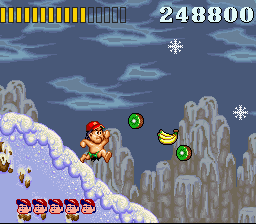
Super Adventure Island relies on its basic simplicity and charm. It very much has a “back to the basics” feel to it. Gone are the various creatures Master Higgins can ride from 1991’s Adventure Island II. Instead it’s just you, your jumping skills and a pair of weapons that can be upgraded. Oh, and the skateboard makes a token cameo here and there. There is some variety thrown in, including a mine cart riding section, swimming levels and vertically scrolling stages. The one hit deaths can get a bit aggravating, but it’s not impossible to beat with a little dedication.
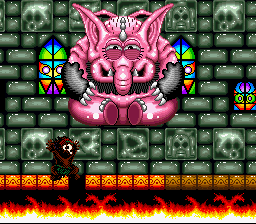
Graphically, the game is loaded with bright, colorful visuals. Each level has a different look and feel to them thanks to the rich colors. The music was composed by Yuzo Koshiro and to no one’s surprise is very good. The control is where the game falters a bit. Master Higgins is a bit stiff. Sure he’s a chubby lad but so was Mario and Mario moved just fine. There is a sort of stilted feel to Super Adventure Island. You get used to it after a while but at the same time the game is made more difficult by Higgins’ limited movement.
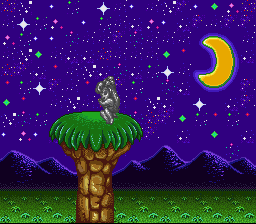
All in all, Super Adventure Island is very much a sign of the times. It’s been 25 years now since it came out, and this is how gaming kind of was back then before things got overly complex. There’s a charm to the game, despite how flawed it may be. It’s kind of a guilty pleasure, in fact. And a quirky little relic from the days of old. The sequel, Super Adventure Island II, is leagues better. But for those looking for an old school, straight forward, super simplistic platformer, you could do far worse than Super Adventure Island.
Graphics: 8
Sound: 8
Gameplay: 6
Longevity: 5
Overall: 6.0
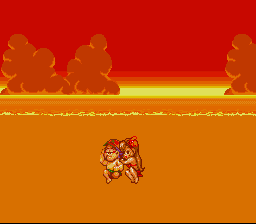
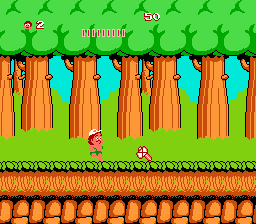
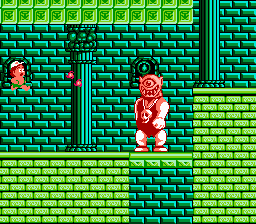
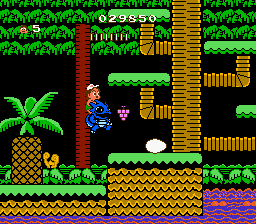
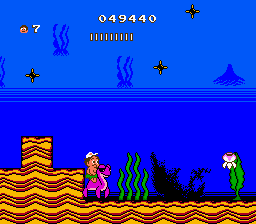
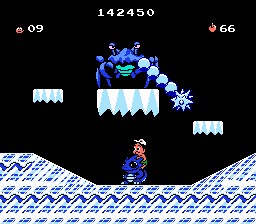
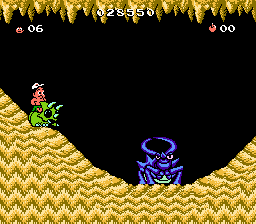
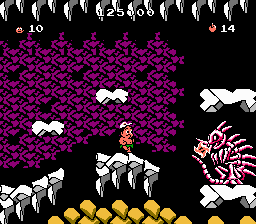
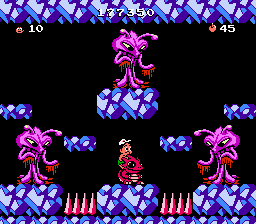
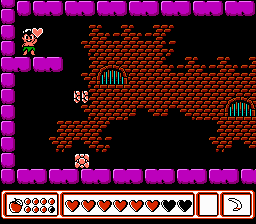
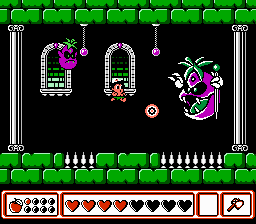
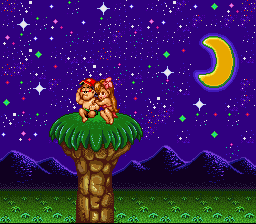
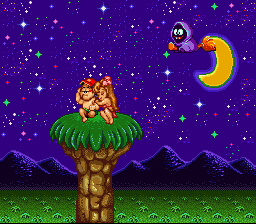
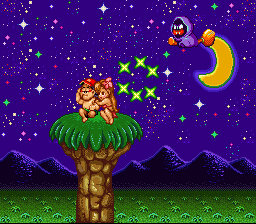
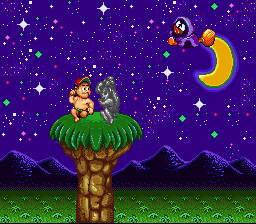
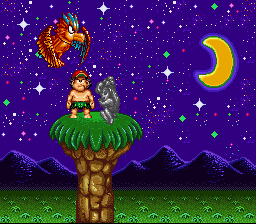
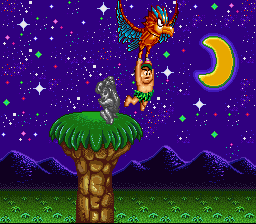
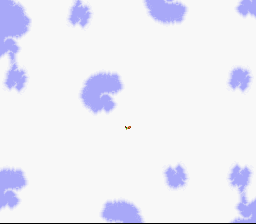
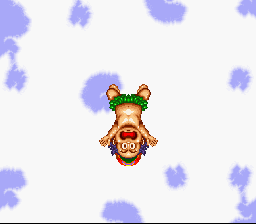
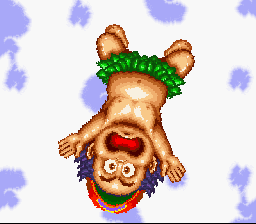
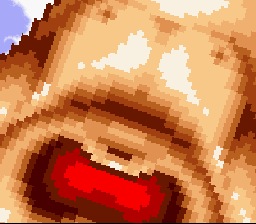
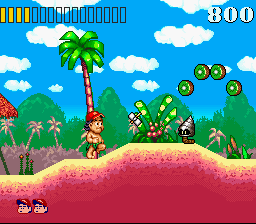
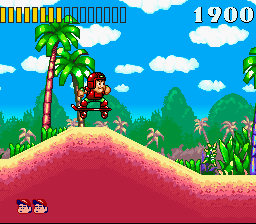
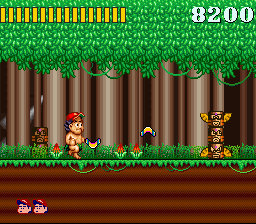
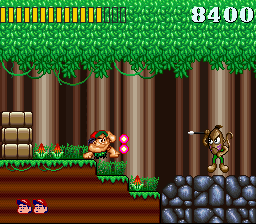
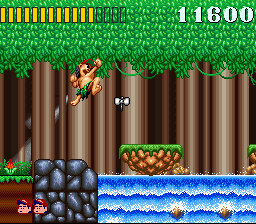
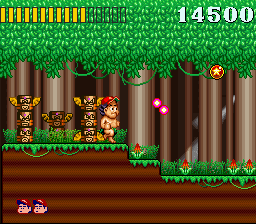
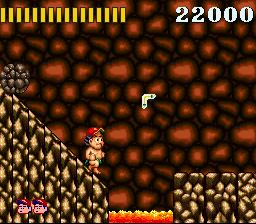
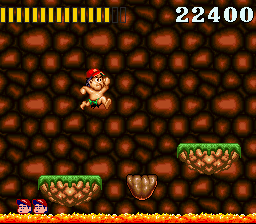
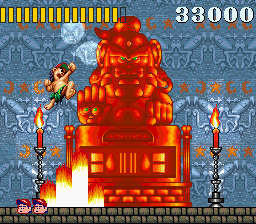
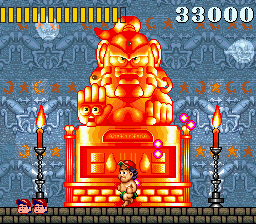
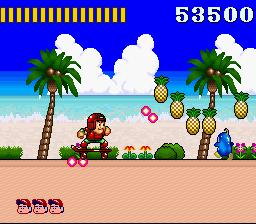
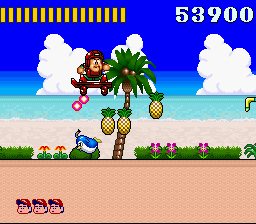
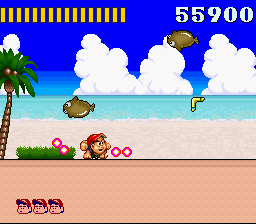
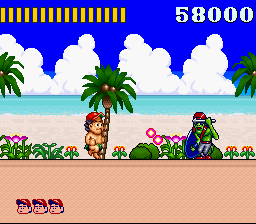
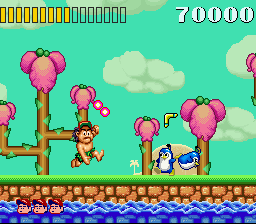
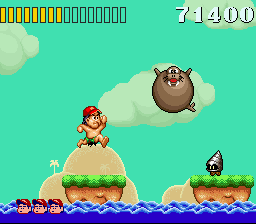
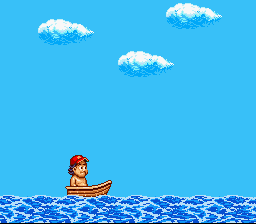
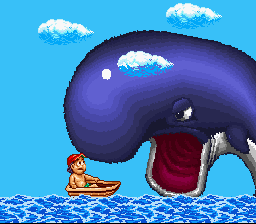
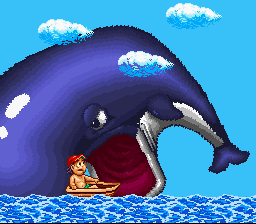
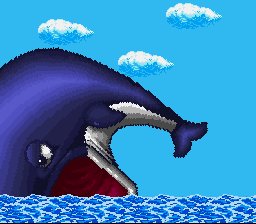
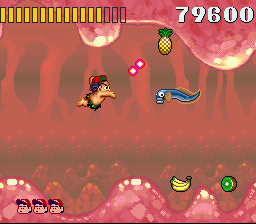
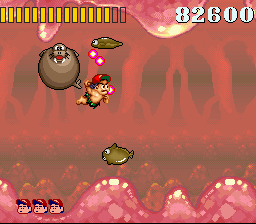
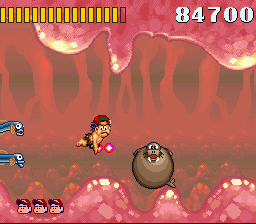
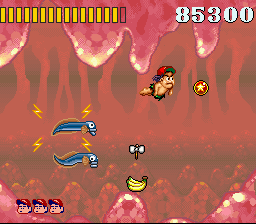
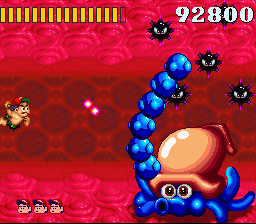
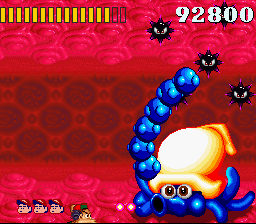
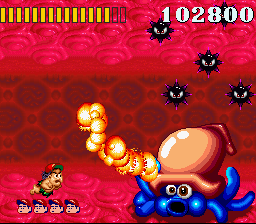
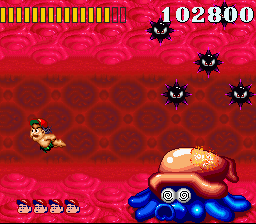
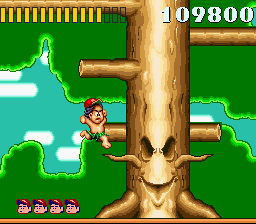
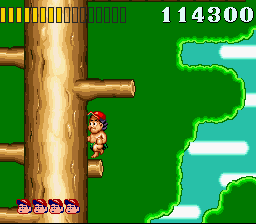
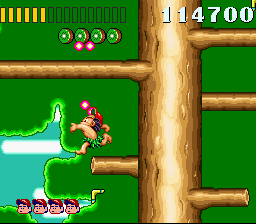
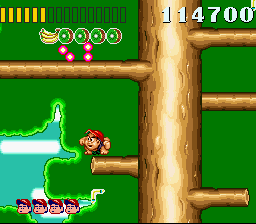
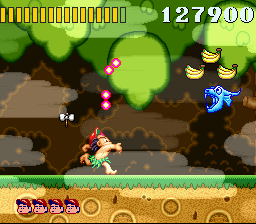
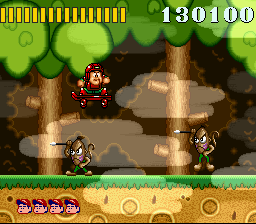

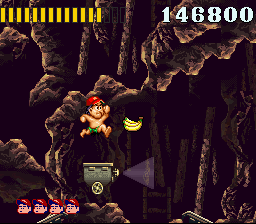
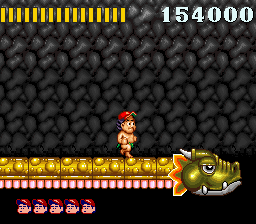
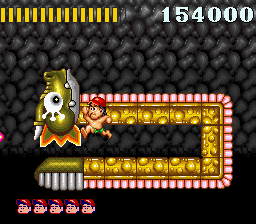
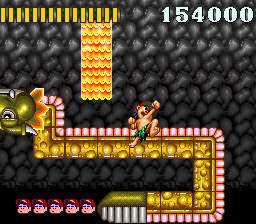
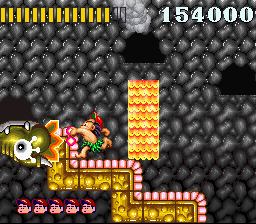
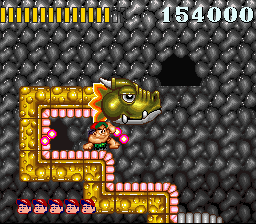
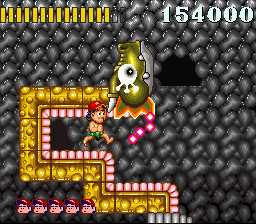
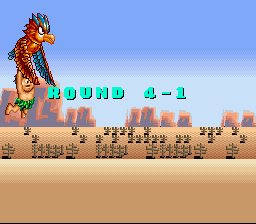
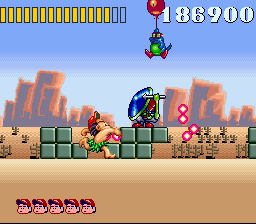
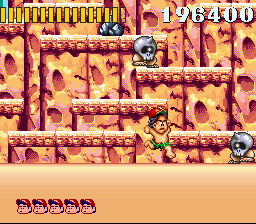
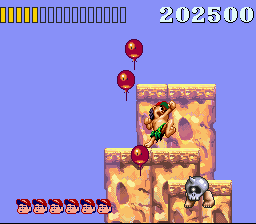
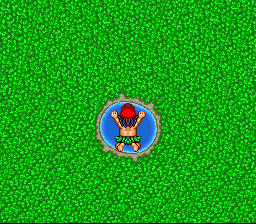
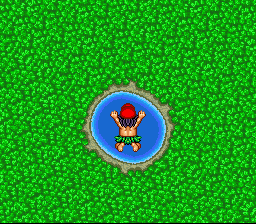
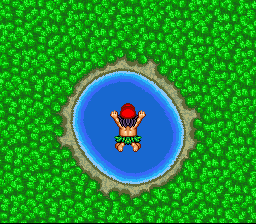
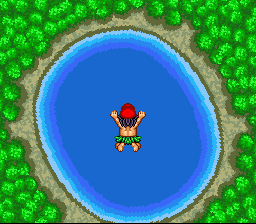
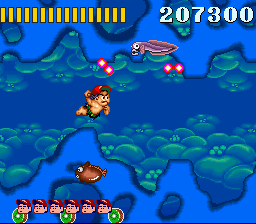
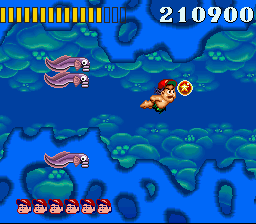
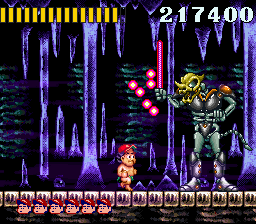
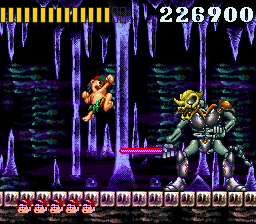
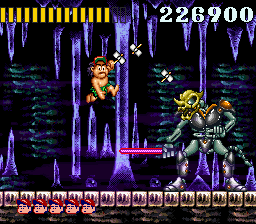
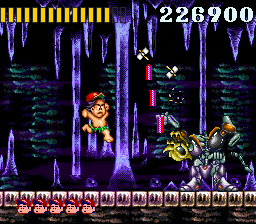
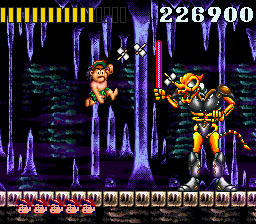
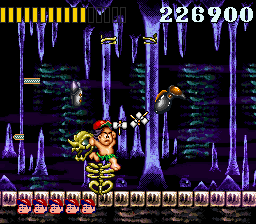
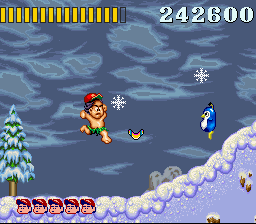
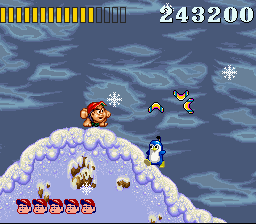
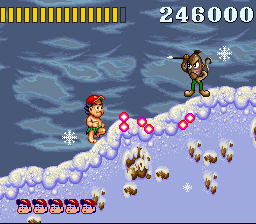
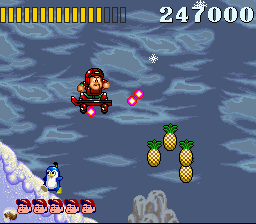
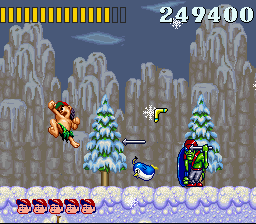
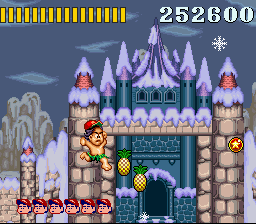
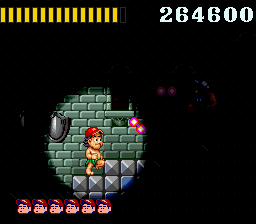
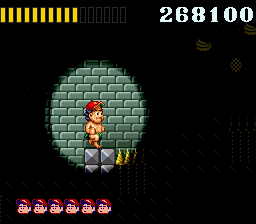
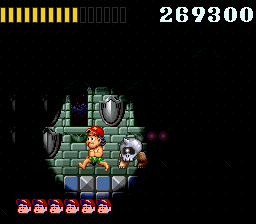
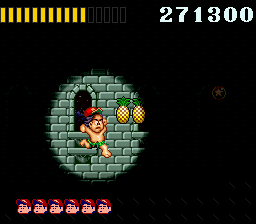
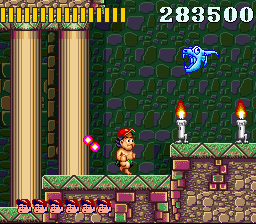
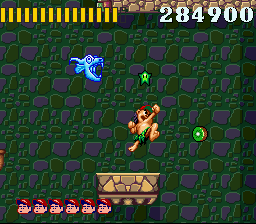
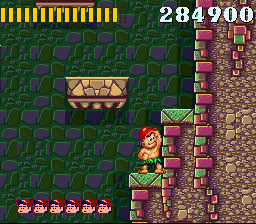
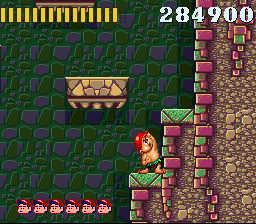
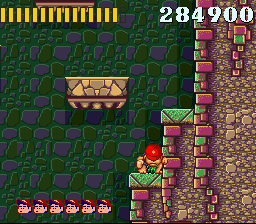
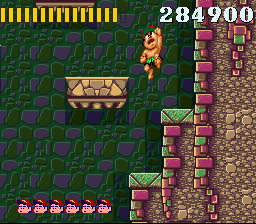
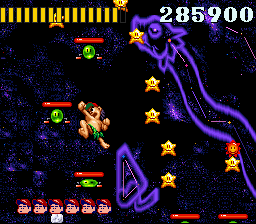
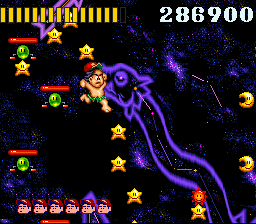

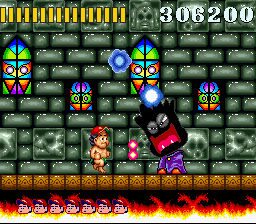
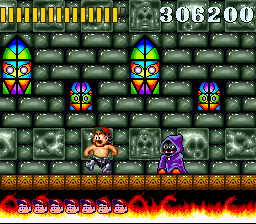
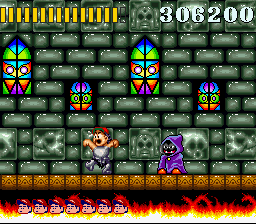
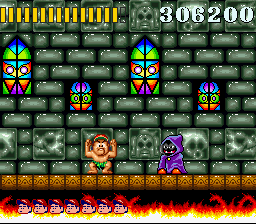
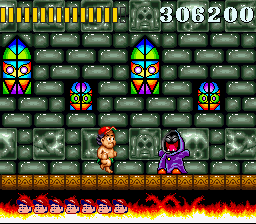
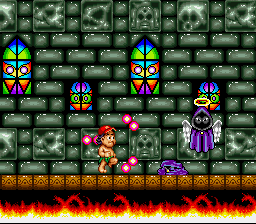
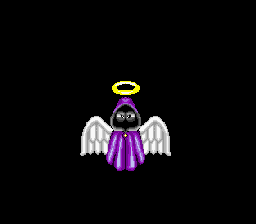
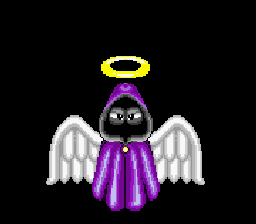
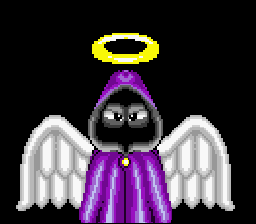
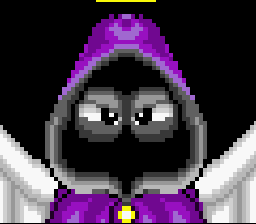
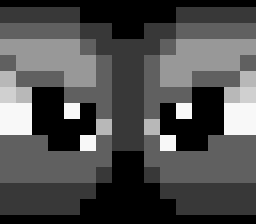
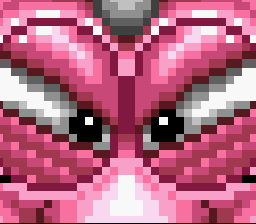
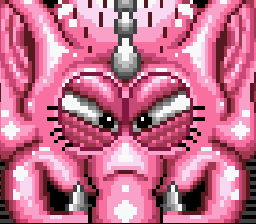
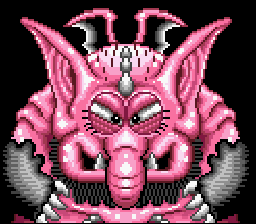
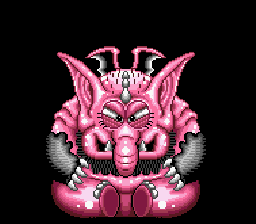
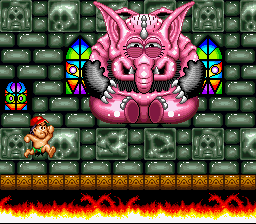
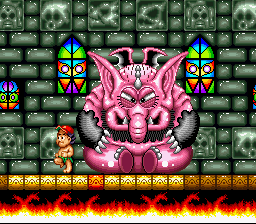
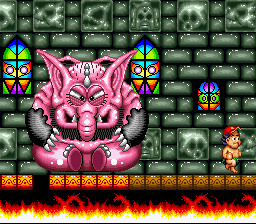
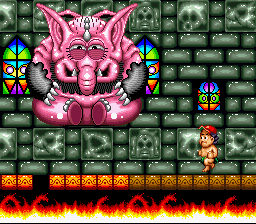
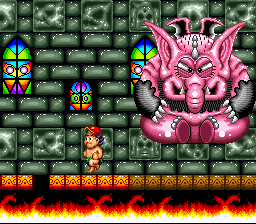
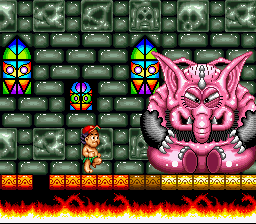
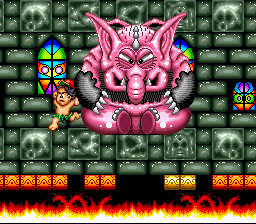
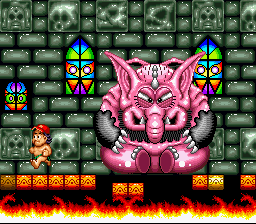
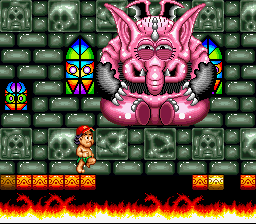
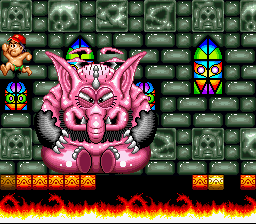
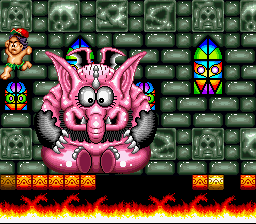
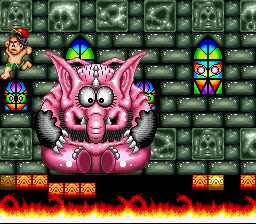
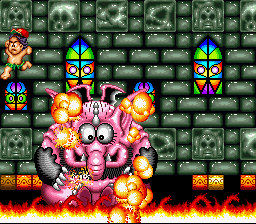
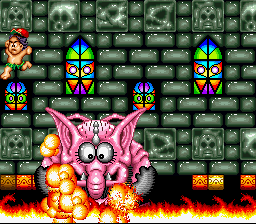
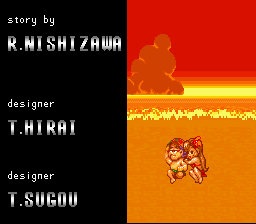
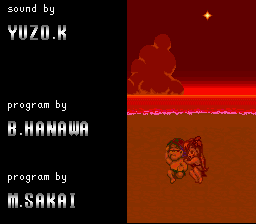
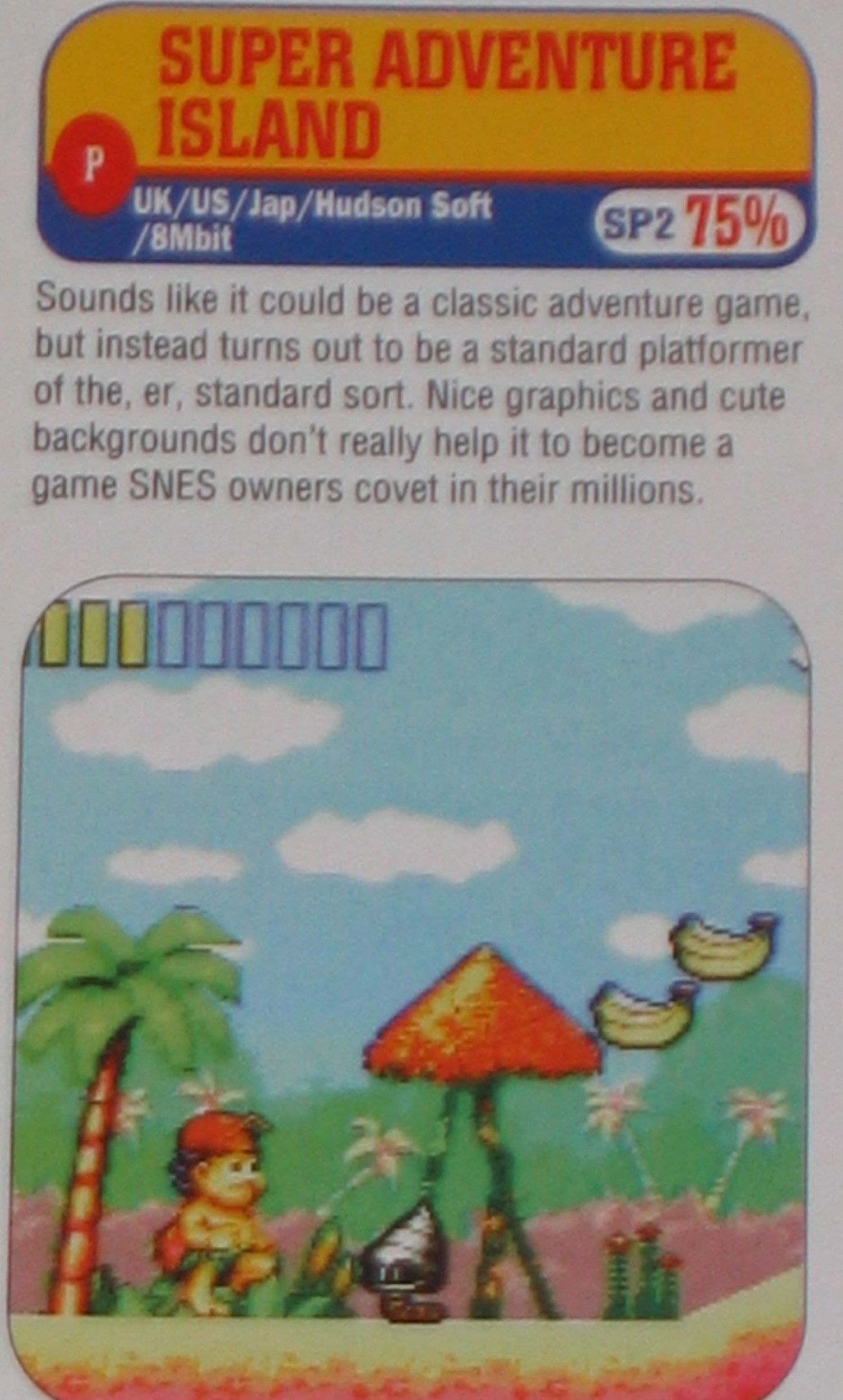
Super Adventure Island is personally my least favorite of the five Takahashi Meijin/Adventure Island games that I played for I found it to be rather bland and average fare. I think what it gets down to for me is the gameplay: Master Higgins’ inability to dash on foot like in the other games was a huge mistake on Produce’s part as it makes it feel like a slog at points (not to mention lacking polish) and the way the super jump is accomplished through pressing down and jump feels super awkward. =( Games like Elnard/The 7th Saga and Brain Lord prove that Produce’s strong suit is RPGs, but in my eyes this platformer proved that this particular genre is wrong for them.
I’m not sure how Yuzo Koshiro got involved in this game, but I’m glad he did because his calypso soundtrack–while a different style compared to his work on Ancient Ys Vanished Chapters 1 and 2, ActRaiser, and Streets of Rage–is the main highlight of the game for me, though I’d be remiss if I didn’t feel that this game as a whole seemed to come across as nothing more than a visual and sound tech demo (namely for the Mode 7 moments, which ARE well done; the main character does look good, but I find it interesting that in the Nintendo 16-bit games his hat is red like Mario’s but in all the other games it’s white).
I felt that the only non-Nintendo game in the series New Adventure Island on the TurboGrafx-16 (which I downloaded on the Nintendo Wii U Virtual Console last Summer) was a huge improvement mere months following Super’s release as it was wholesomely fun for the dashing ability was back, the visuals were more colorful, exciting area design, and it hugely benefited from its strong sense of polish and charm in my opinion.
Hey StarBoy! Good to hear from you again. I agree. Great observations on your part, and thanks for sharing the Produce factoids (7th Saga, Brain Lord). “SAI” is definitely a visual treat and features some gnarly tunes from master composer Koshiro (Streets of Rage and ActRaiser fame) but it definitely falls short when it comes to the gameplay. A run button would have helped this game out so much. I’m currently working on a review for Super Adventure Island II which I hope to get out later this weekend. It’s a far superior product as compared to this game. Yeah, it’s funny that they changed Master Higgins’ hat to be red in this version. Hence why I made the tongue-in-cheek joke “Discount Mario”…
So I decided to look deeply into Produce’s Takahashi Meijin no Daibōken Jima/Super Adventure Island’s game’s credits in preparation for my re-review of it on my blog (I feel the original does not hold up as it was written before I got to play all the other games that came out afterward, not to mention it was back before I took deep, well-rounded research seriously), and some names caught my attention (apart from Yuzo Koshiro, I already knew about that… I’m still scratching my head regarding his involvement): namely “Story by Ryuchi Nishizawa”, aka creator and consultant of the Wonder Boy franchise, and said franchise’s developer Westone served as supervisor here–which is really bizarre considering that the Wonder Boy and Takahashi Meijin/Adventure Island franchises (both of which began as pretty much the same game, only with several details altered so it would not be 100% the same) would each go in a different direction (with the former’s sequels adopting action-RPG elements and the latter’s sequels, apart from Takahashi Meijin no Bōken Jima IV and Super Adventure Island II/Takahashi Meijin no Daibōken Jima II, would vie for straightforward action fare) and Nishizawa’s roots came from the Wonder Boy franchise and mainly worked on those games only (and this is the only Takahashi Meijin/Adventure Island installment he was ever involved with… unfortunate; not just him though, but everyone involved in development). That said, considering how little there is of it in this game, I can’t help but find that story credit to be a moot point as there is nothing in-game to indicate such a thing (unless you count the occasional Mode 7 sequences and abrupt ending with no build up or fanfare leading up to it after defeating Black Mantle), not even a written story progression or a map to let you where you are going next, it just thrusts you from location to location. One of the programmers, Makoto Sakai, and three out of five designers would go on to work on Elnard (another Produce title) as sub programmer and graphic designers (T. Hirai and T. Sugou)/graphics director (J. Kusaka) respectively (although the less said about that RPG’s localization as The 7th Saga and how Enix of America royally screwed the pooch by augmenting a high degree of difficulty by reducing the stats of the chosen apprentice and stats you gain with each level and *not* for the other six apprentices as well thereby creating a sense of irreparably broken imbalance, the better, as I find the original Japanese version more enjoyable, manageable, and palatable to play, in my opinion; especially since the Super Famicart original has been growing on me the more I played it during the past month… and this month… yep, I’m going all in, as I plan to beat it with all seven apprentices; beat it two times so far in the span of six days, presently speaking I’m on my third playthrough). Well, got carried away there for a second; I’m not sure why Produce felt the need to go at a slow pace for this game as the pacing is slow but lacking in purpose, whereas if there was a point to it then it would different, and honestly Nishizawa and Westone’s credits here baffle me and makes me Wonder ( ) what happened, and the direction by Kyon Kyon, who designed for a couple of platformers beforehand, could’ve purely benefited from polish. I’d ask why some of the staff who worked on the second iteration of the Takahashi Meijin/Adventure Island franchise couldn’t be involved in this one, but chances are they were too busy making Takahashi Meijin no Shin Bōken Jima/New Adventure Island and Takahashi Meijin no Bōken Jima III/Adventure Island III to be available.
) what happened, and the direction by Kyon Kyon, who designed for a couple of platformers beforehand, could’ve purely benefited from polish. I’d ask why some of the staff who worked on the second iteration of the Takahashi Meijin/Adventure Island franchise couldn’t be involved in this one, but chances are they were too busy making Takahashi Meijin no Shin Bōken Jima/New Adventure Island and Takahashi Meijin no Bōken Jima III/Adventure Island III to be available.
To each their own
As always my friend, you are a wealth of video game knowledge
I’ve stayed away from the North American version of the 7th Saga, but I beat the “Easier” version, which I enjoyed to a fair degree. Have no desire for the moment being to return to it anytime soon but I can see why others really like it.
A belated happy new year to you bro!